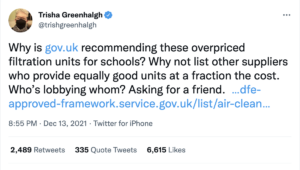The Future Belongs To AI Powered Purchasing.

This week a respected Professor took to Twitter to criticise the government’s purchasing arrangements.

It was immediately clear what had happened, a supplier with what must have been the best overall catalogue of goods and prices had earned a place on a framework providing electrical equipment for schools. Their products were subsequently promoted by Crown Commercial Service (CCS) as the best option.
It took minutes for some of Prof Greenhalgh’s followers to find better alternatives to those offered on the framework. The problem becomes clear: CCS had chosen the best supplier for the collective needs of schools, but the followers were assessing that supplier on the pricing and capabilities of a specific product.
This problem isn’t going to go away. As data on products and performance of companies becomes more pervasive, procurement teams are going to be expected to respond to information as it becomes available.
Consumers are used to being able to instantly evaluate products and companies based on prices, ratings, and detailed specifications. Setting up long contracts based on the best overall supplier works for complex procurements, but once a product or service becomes commoditised, the fast flow of relevant data is what will make the difference.
Buyers need to think in terms of dynamic markets, where key items of information are gathered from multiple sources and then AI is used to recommend the correct product for purchase based on that data.
We are already starting to see something like this with electricity purchasing, there’s no reason why this can’t be applied to IT equipment and other commodity categories. It is time for buyers to be ready for purchasing to become much more algorithmic in nature.
Get in touch, if you’d like to chat about your government procurement data needs, and how we can help.



